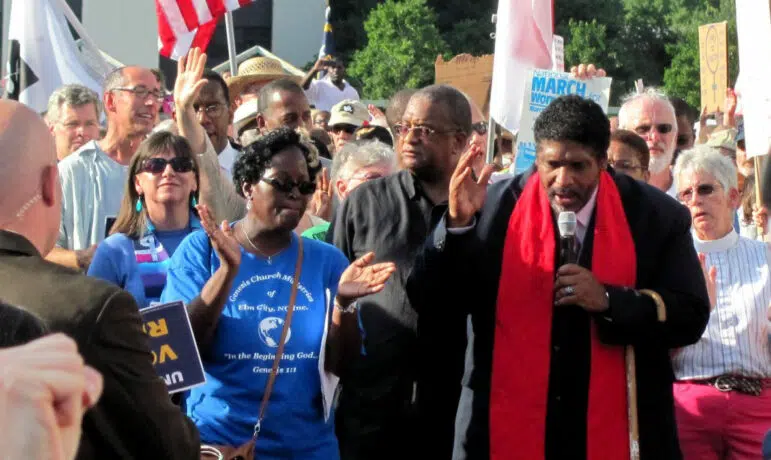
Leading the Charge: The Power of Black Clergy in the Fight for Climate Justice
Nearly 30 years ago, a report commissioned by the United Church of Christ (UCC), Toxic Waste and Race, put faith leadership at the forefront of the movement that would bring a powerful racial justice component to the fight for a clean environment.
By pointing out that three out of every five African Americans and Latinos lived near a toxic facility or power plant, the faith community changed environmentalism forever. This national study rendered it impossible to examine our toxic economic policies without recognizing the disproportionate impact these facilities have on communities of color. The report was also clarion call to right this egregious injustice.
As we approach the 10th Anniversary of Hurricane Katrina, we find ourselves at the nexus of a polluting industry that sickens our communities and the catastrophic impacts, also disproportionately borne by our communities, of changes in climate resulting from this pollution in our neighborhoods.
Therefore, black faith leaders have a critical role as we expand the fight for environmental justice to encompass an explicit climate justice lens. And it is for that reason that we will be holding a training for clergy located in or near the Gulf Region, to support clergy leaders as advocates for climate justice.
Already faith leaders have taken up the mantle of putting a spotlight on inequities and demanding change. In North Carolina, Reverend William Barber, II, the head of the NAACP State Conference, leads Moral Mondays, a massive popular movement that incorporates strident calls for climate justice with other issues including health, education, voting rights, and criminal justice . As the NAACP launched a civil rights probe into how the negative health impacts from fracking and coal-fired plants fall disproportionately on communities of color, it was clear just how vital the leadership of black faith leaders can be. During the announcement, Reverend Barber said:
Health and environmental justice are two fights we must engage in. Extremist policies that undermine healthcare and environmental protections cost lives, and therefore are immoral and a violation of our most sacred values regarding equal protection under the law.
Black faith leaders are integral because clergy, in their work to improve the quality of life of everyone in their community, but especially the most downtrodden, have a special moral authority. When the policies that allow entities to pollute with impunity while they amass the private wealth of the few put at risk the health and well-being of the many who have the least, faith leaders are duty-bound to take up the cause of the dispossessed.
What better front, then, than that of the climate, where the inequitable practices of city planning and disaster response leave entire communities out of the discussion and, accordingly, left to fend for themselves? Working to give voice to the many in their congregations who have no voice within the system as it currently exists is what fires the activism of many faith leaders. Here is Reverend Theresa Dear of Illinois as she gives testimony at a hearing concerning the EPA’s Mercury and Air Toxics (MATS) Rule for polluting power plants:
Jesus gives us a charge from the Bible and He says ‘That which you do unto the least of these, is that which you do unto Me.’ And so I am asking for our children, I’m asking for our child bearing women, and I’m asking for all unborn children that you revisit this lead level of 5% and redefine it to 0% or zero tolerance. I am asking because they can’t change this policy. But you can. They can’t change this standard because they are helpless and they are powerless and they are voiceless. But you are not.
This prophetic leadership is especially necessary in the Gulf region. The recovery and planning efforts in the wake of Hurricane Katrina exposed the importance of including the racial justice lens in building community resiliency. While this tragic event showed the desperate need for greater equity in future disaster response efforts by national and local governments, leaders like Reverend Tyronne Edwards refused to wait for the government to do something about it.
A lot of work that we’ve been doing as a community has been done without any government dollars – so that’s why I can talk the way I talk. We don’t go around begging anyone for anything but we are saying that this government owes our communities a lot.
The strong moral authority of black clergy, taking charge in bleak times and giving voice to the voiceless, shines through example. We want to build this vital leadership’s strengths as effective communicators in the fight for environmental and climate justice. Leadership that puts the interests of those with the least at the forefront shows true integrity and this moral example provides inspiration to others.
Reverend Dr. Philip Karl James clearly understands the power of leading by example as he speaks in the video below about the $15,000 of energy efficiency the church has saved:
So we are linking arms with black clergy members as they take the lead! We ask those in the Gulf area to participate in next week’s training conducted by the NAACP, in partnership with the Climate Reality Project Climate Speaker’s Network. It is important that the voices of those whose flocks are suffering real, deadly costs every day due to the drivers of climate change, have a chance to be heard above those who have not learned that Big Coal and Big Oil are not serving the interests of our communities.
Not only will participants become certified members of the Climate Reality Project’s Speakers Network, they will also be inaugural members of the NAACP Black Church Leadership Initiative on Environmental and Climate Justice.
